Organisational Behaviour Report: BBC's Culture, Power, and Politics
VerifiedAdded on 2020/07/22
|19
|6431
|30
Report
AI Summary
This report provides a detailed analysis of organisational behaviour at the BBC, a public service broadcaster. It begins by exploring Handy's cultural typology, specifically examining power, role, task, and person cultures, and how these elements influence the organization's structure and employee behavior. The report then investigates how culture, power dynamics, and organizational politics affect individuals and teams within the BBC, highlighting potential conflicts and impacts on employee motivation and productivity. Furthermore, the report delves into motivational theories, including Maslow's Hierarchy of Needs and Herzberg's Two-Factor Theory, evaluating their application within the BBC to improve team effectiveness and employee engagement. The analysis extends to team development, discussing different team types and the Tuckman model, before concluding with an evaluation of organizational theories and their impact on the BBC's performance and potential barriers.
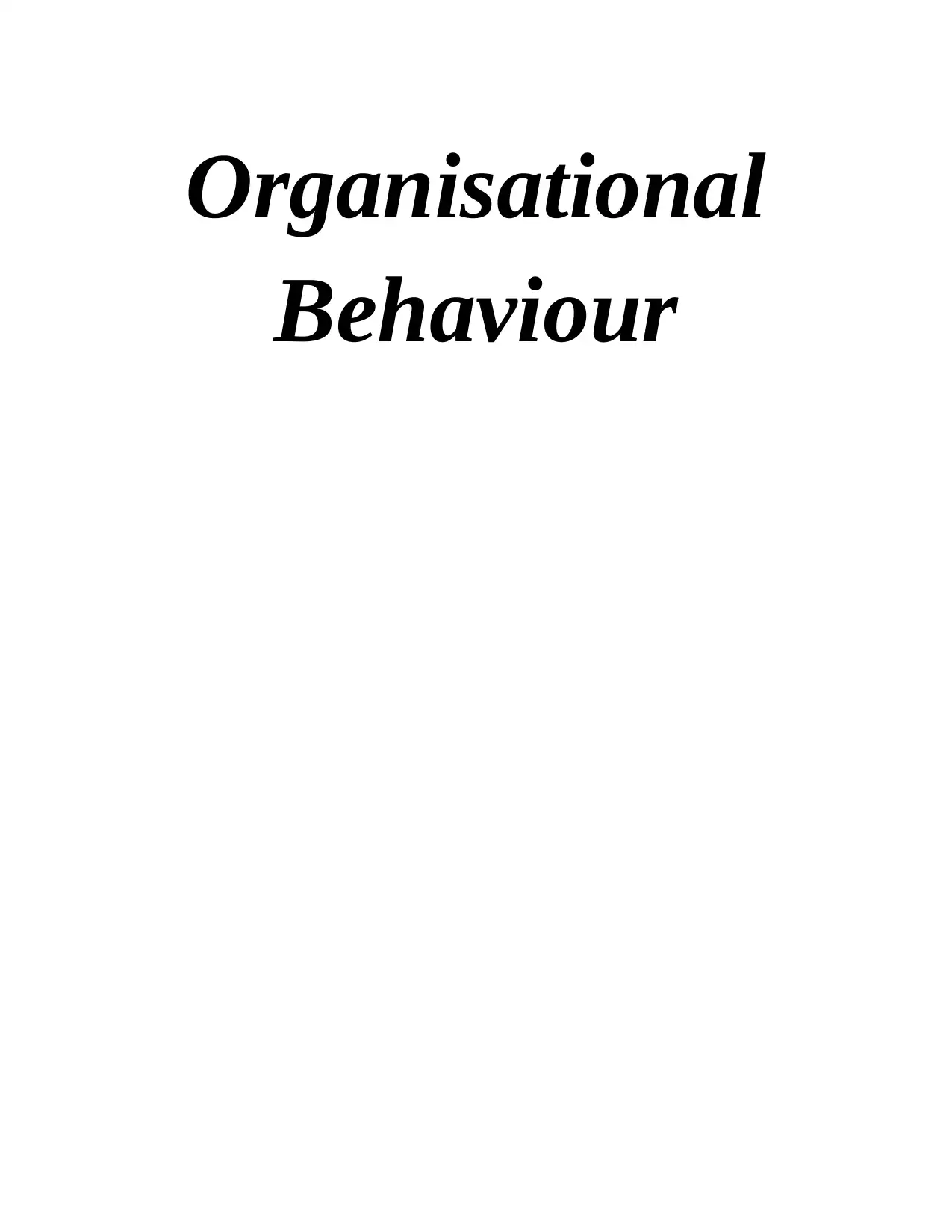
Organisational
Behaviour
Behaviour
Paraphrase This Document
Need a fresh take? Get an instant paraphrase of this document with our AI Paraphraser
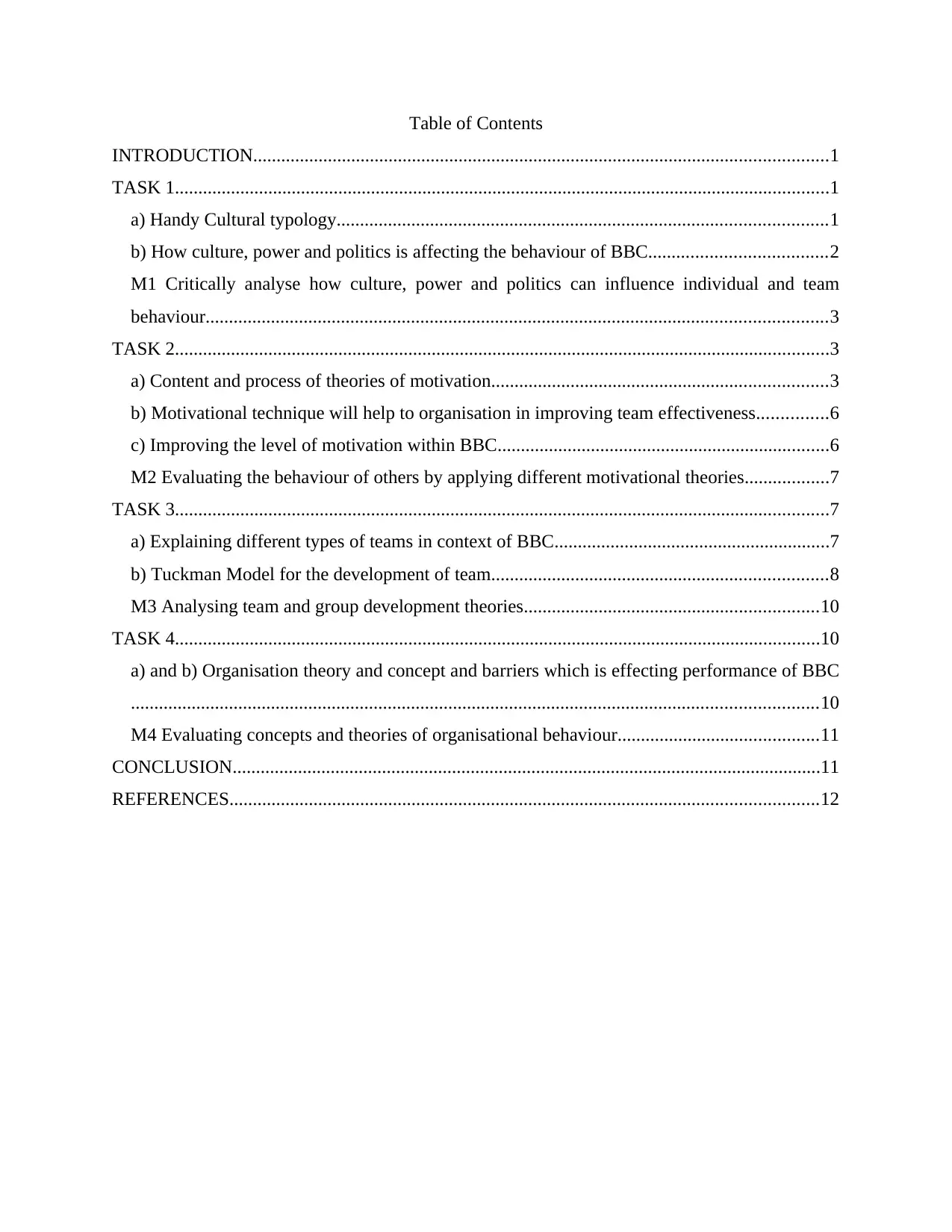
Table of Contents
INTRODUCTION...........................................................................................................................1
TASK 1............................................................................................................................................1
a) Handy Cultural typology.........................................................................................................1
b) How culture, power and politics is affecting the behaviour of BBC......................................2
M1 Critically analyse how culture, power and politics can influence individual and team
behaviour.....................................................................................................................................3
TASK 2............................................................................................................................................3
a) Content and process of theories of motivation........................................................................3
b) Motivational technique will help to organisation in improving team effectiveness...............6
c) Improving the level of motivation within BBC.......................................................................6
M2 Evaluating the behaviour of others by applying different motivational theories..................7
TASK 3............................................................................................................................................7
a) Explaining different types of teams in context of BBC...........................................................7
b) Tuckman Model for the development of team........................................................................8
M3 Analysing team and group development theories...............................................................10
TASK 4..........................................................................................................................................10
a) and b) Organisation theory and concept and barriers which is effecting performance of BBC
...................................................................................................................................................10
M4 Evaluating concepts and theories of organisational behaviour...........................................11
CONCLUSION..............................................................................................................................11
REFERENCES..............................................................................................................................12
INTRODUCTION...........................................................................................................................1
TASK 1............................................................................................................................................1
a) Handy Cultural typology.........................................................................................................1
b) How culture, power and politics is affecting the behaviour of BBC......................................2
M1 Critically analyse how culture, power and politics can influence individual and team
behaviour.....................................................................................................................................3
TASK 2............................................................................................................................................3
a) Content and process of theories of motivation........................................................................3
b) Motivational technique will help to organisation in improving team effectiveness...............6
c) Improving the level of motivation within BBC.......................................................................6
M2 Evaluating the behaviour of others by applying different motivational theories..................7
TASK 3............................................................................................................................................7
a) Explaining different types of teams in context of BBC...........................................................7
b) Tuckman Model for the development of team........................................................................8
M3 Analysing team and group development theories...............................................................10
TASK 4..........................................................................................................................................10
a) and b) Organisation theory and concept and barriers which is effecting performance of BBC
...................................................................................................................................................10
M4 Evaluating concepts and theories of organisational behaviour...........................................11
CONCLUSION..............................................................................................................................11
REFERENCES..............................................................................................................................12
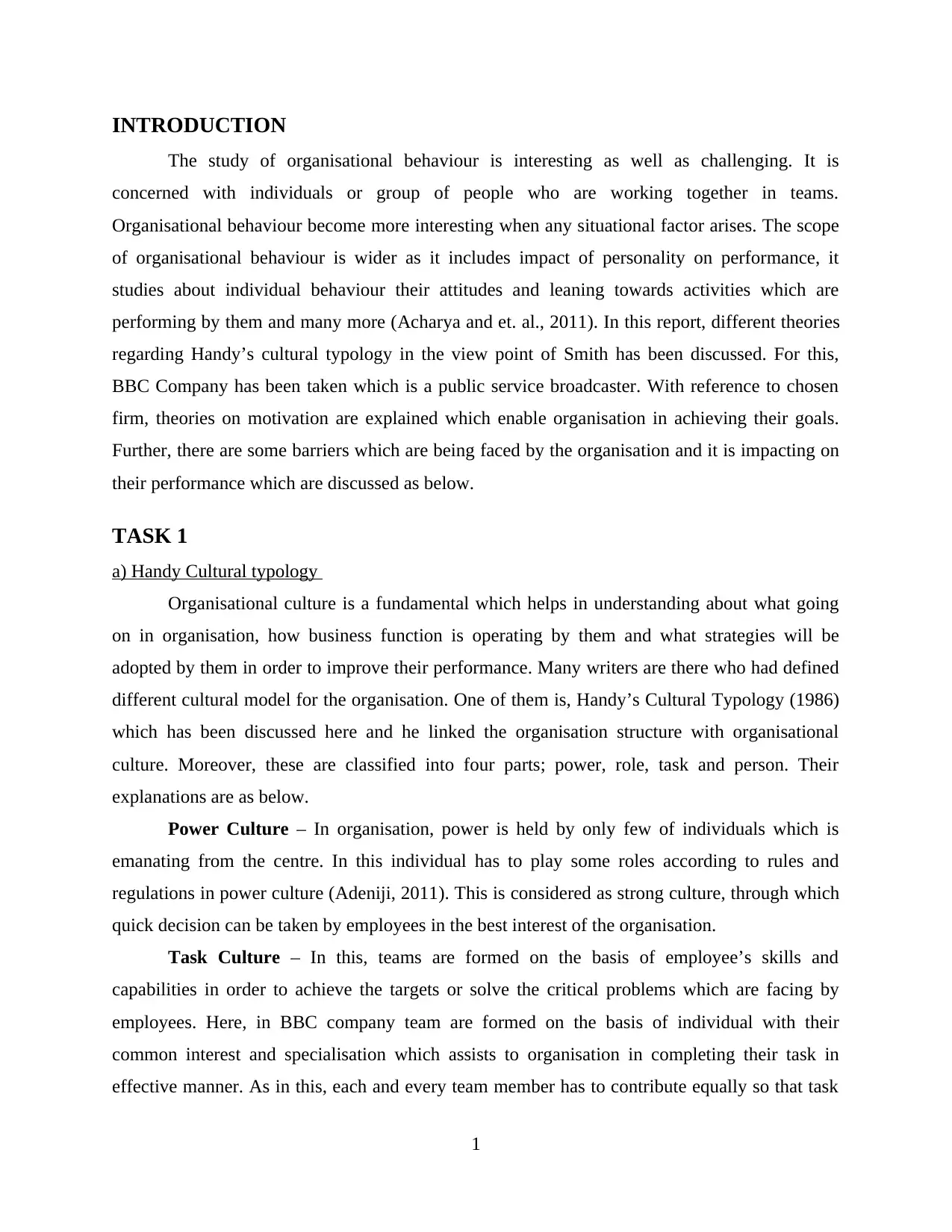
INTRODUCTION
The study of organisational behaviour is interesting as well as challenging. It is
concerned with individuals or group of people who are working together in teams.
Organisational behaviour become more interesting when any situational factor arises. The scope
of organisational behaviour is wider as it includes impact of personality on performance, it
studies about individual behaviour their attitudes and leaning towards activities which are
performing by them and many more (Acharya and et. al., 2011). In this report, different theories
regarding Handy’s cultural typology in the view point of Smith has been discussed. For this,
BBC Company has been taken which is a public service broadcaster. With reference to chosen
firm, theories on motivation are explained which enable organisation in achieving their goals.
Further, there are some barriers which are being faced by the organisation and it is impacting on
their performance which are discussed as below.
TASK 1
a) Handy Cultural typology
Organisational culture is a fundamental which helps in understanding about what going
on in organisation, how business function is operating by them and what strategies will be
adopted by them in order to improve their performance. Many writers are there who had defined
different cultural model for the organisation. One of them is, Handy’s Cultural Typology (1986)
which has been discussed here and he linked the organisation structure with organisational
culture. Moreover, these are classified into four parts; power, role, task and person. Their
explanations are as below.
Power Culture – In organisation, power is held by only few of individuals which is
emanating from the centre. In this individual has to play some roles according to rules and
regulations in power culture (Adeniji, 2011). This is considered as strong culture, through which
quick decision can be taken by employees in the best interest of the organisation.
Task Culture – In this, teams are formed on the basis of employee’s skills and
capabilities in order to achieve the targets or solve the critical problems which are facing by
employees. Here, in BBC company team are formed on the basis of individual with their
common interest and specialisation which assists to organisation in completing their task in
effective manner. As in this, each and every team member has to contribute equally so that task
1
The study of organisational behaviour is interesting as well as challenging. It is
concerned with individuals or group of people who are working together in teams.
Organisational behaviour become more interesting when any situational factor arises. The scope
of organisational behaviour is wider as it includes impact of personality on performance, it
studies about individual behaviour their attitudes and leaning towards activities which are
performing by them and many more (Acharya and et. al., 2011). In this report, different theories
regarding Handy’s cultural typology in the view point of Smith has been discussed. For this,
BBC Company has been taken which is a public service broadcaster. With reference to chosen
firm, theories on motivation are explained which enable organisation in achieving their goals.
Further, there are some barriers which are being faced by the organisation and it is impacting on
their performance which are discussed as below.
TASK 1
a) Handy Cultural typology
Organisational culture is a fundamental which helps in understanding about what going
on in organisation, how business function is operating by them and what strategies will be
adopted by them in order to improve their performance. Many writers are there who had defined
different cultural model for the organisation. One of them is, Handy’s Cultural Typology (1986)
which has been discussed here and he linked the organisation structure with organisational
culture. Moreover, these are classified into four parts; power, role, task and person. Their
explanations are as below.
Power Culture – In organisation, power is held by only few of individuals which is
emanating from the centre. In this individual has to play some roles according to rules and
regulations in power culture (Adeniji, 2011). This is considered as strong culture, through which
quick decision can be taken by employees in the best interest of the organisation.
Task Culture – In this, teams are formed on the basis of employee’s skills and
capabilities in order to achieve the targets or solve the critical problems which are facing by
employees. Here, in BBC company team are formed on the basis of individual with their
common interest and specialisation which assists to organisation in completing their task in
effective manner. As in this, each and every team member has to contribute equally so that task
1
⊘ This is a preview!⊘
Do you want full access?
Subscribe today to unlock all pages.

Trusted by 1+ million students worldwide
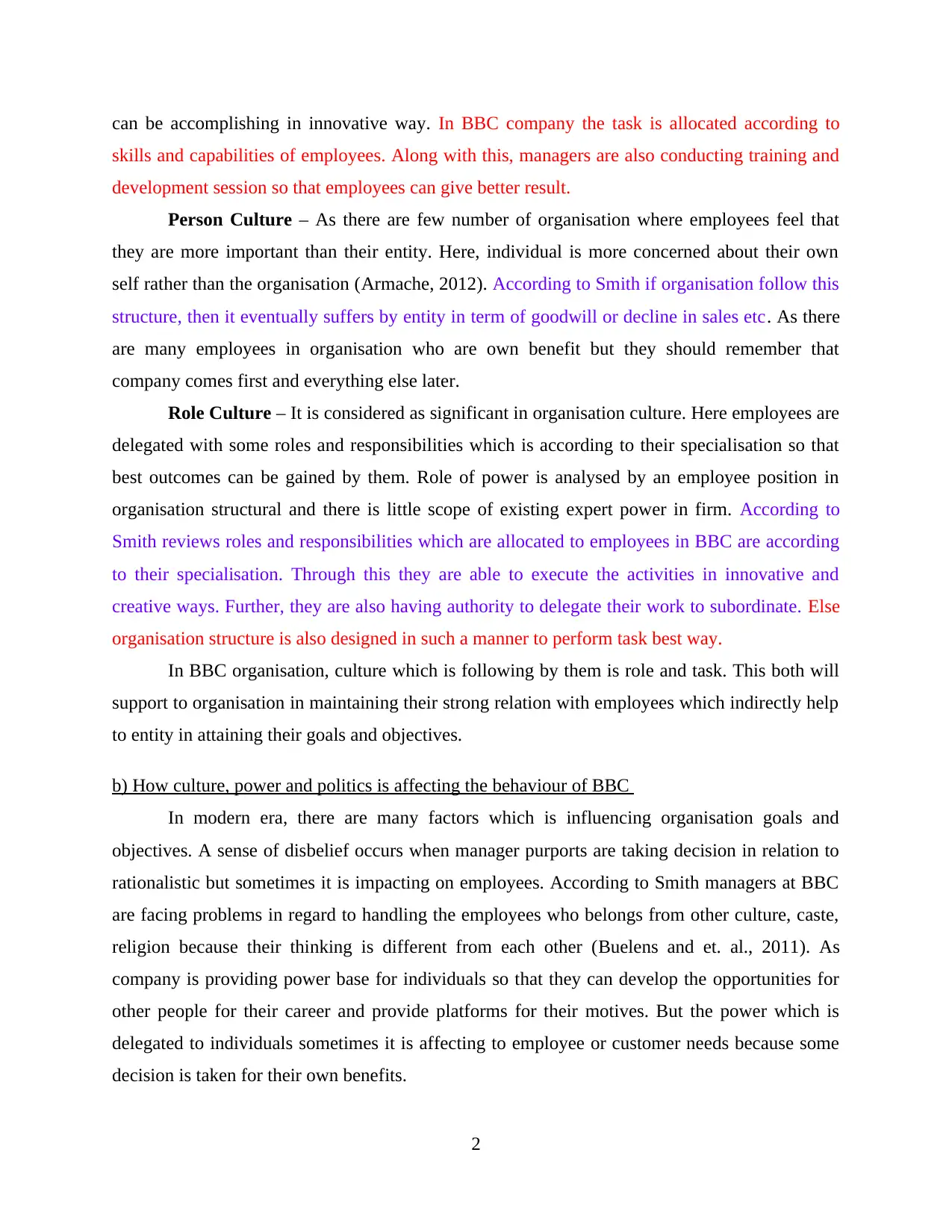
can be accomplishing in innovative way. In BBC company the task is allocated according to
skills and capabilities of employees. Along with this, managers are also conducting training and
development session so that employees can give better result.
Person Culture – As there are few number of organisation where employees feel that
they are more important than their entity. Here, individual is more concerned about their own
self rather than the organisation (Armache, 2012). According to Smith if organisation follow this
structure, then it eventually suffers by entity in term of goodwill or decline in sales etc. As there
are many employees in organisation who are own benefit but they should remember that
company comes first and everything else later.
Role Culture – It is considered as significant in organisation culture. Here employees are
delegated with some roles and responsibilities which is according to their specialisation so that
best outcomes can be gained by them. Role of power is analysed by an employee position in
organisation structural and there is little scope of existing expert power in firm. According to
Smith reviews roles and responsibilities which are allocated to employees in BBC are according
to their specialisation. Through this they are able to execute the activities in innovative and
creative ways. Further, they are also having authority to delegate their work to subordinate. Else
organisation structure is also designed in such a manner to perform task best way.
In BBC organisation, culture which is following by them is role and task. This both will
support to organisation in maintaining their strong relation with employees which indirectly help
to entity in attaining their goals and objectives.
b) How culture, power and politics is affecting the behaviour of BBC
In modern era, there are many factors which is influencing organisation goals and
objectives. A sense of disbelief occurs when manager purports are taking decision in relation to
rationalistic but sometimes it is impacting on employees. According to Smith managers at BBC
are facing problems in regard to handling the employees who belongs from other culture, caste,
religion because their thinking is different from each other (Buelens and et. al., 2011). As
company is providing power base for individuals so that they can develop the opportunities for
other people for their career and provide platforms for their motives. But the power which is
delegated to individuals sometimes it is affecting to employee or customer needs because some
decision is taken for their own benefits.
2
skills and capabilities of employees. Along with this, managers are also conducting training and
development session so that employees can give better result.
Person Culture – As there are few number of organisation where employees feel that
they are more important than their entity. Here, individual is more concerned about their own
self rather than the organisation (Armache, 2012). According to Smith if organisation follow this
structure, then it eventually suffers by entity in term of goodwill or decline in sales etc. As there
are many employees in organisation who are own benefit but they should remember that
company comes first and everything else later.
Role Culture – It is considered as significant in organisation culture. Here employees are
delegated with some roles and responsibilities which is according to their specialisation so that
best outcomes can be gained by them. Role of power is analysed by an employee position in
organisation structural and there is little scope of existing expert power in firm. According to
Smith reviews roles and responsibilities which are allocated to employees in BBC are according
to their specialisation. Through this they are able to execute the activities in innovative and
creative ways. Further, they are also having authority to delegate their work to subordinate. Else
organisation structure is also designed in such a manner to perform task best way.
In BBC organisation, culture which is following by them is role and task. This both will
support to organisation in maintaining their strong relation with employees which indirectly help
to entity in attaining their goals and objectives.
b) How culture, power and politics is affecting the behaviour of BBC
In modern era, there are many factors which is influencing organisation goals and
objectives. A sense of disbelief occurs when manager purports are taking decision in relation to
rationalistic but sometimes it is impacting on employees. According to Smith managers at BBC
are facing problems in regard to handling the employees who belongs from other culture, caste,
religion because their thinking is different from each other (Buelens and et. al., 2011). As
company is providing power base for individuals so that they can develop the opportunities for
other people for their career and provide platforms for their motives. But the power which is
delegated to individuals sometimes it is affecting to employee or customer needs because some
decision is taken for their own benefits.
2
Paraphrase This Document
Need a fresh take? Get an instant paraphrase of this document with our AI Paraphraser
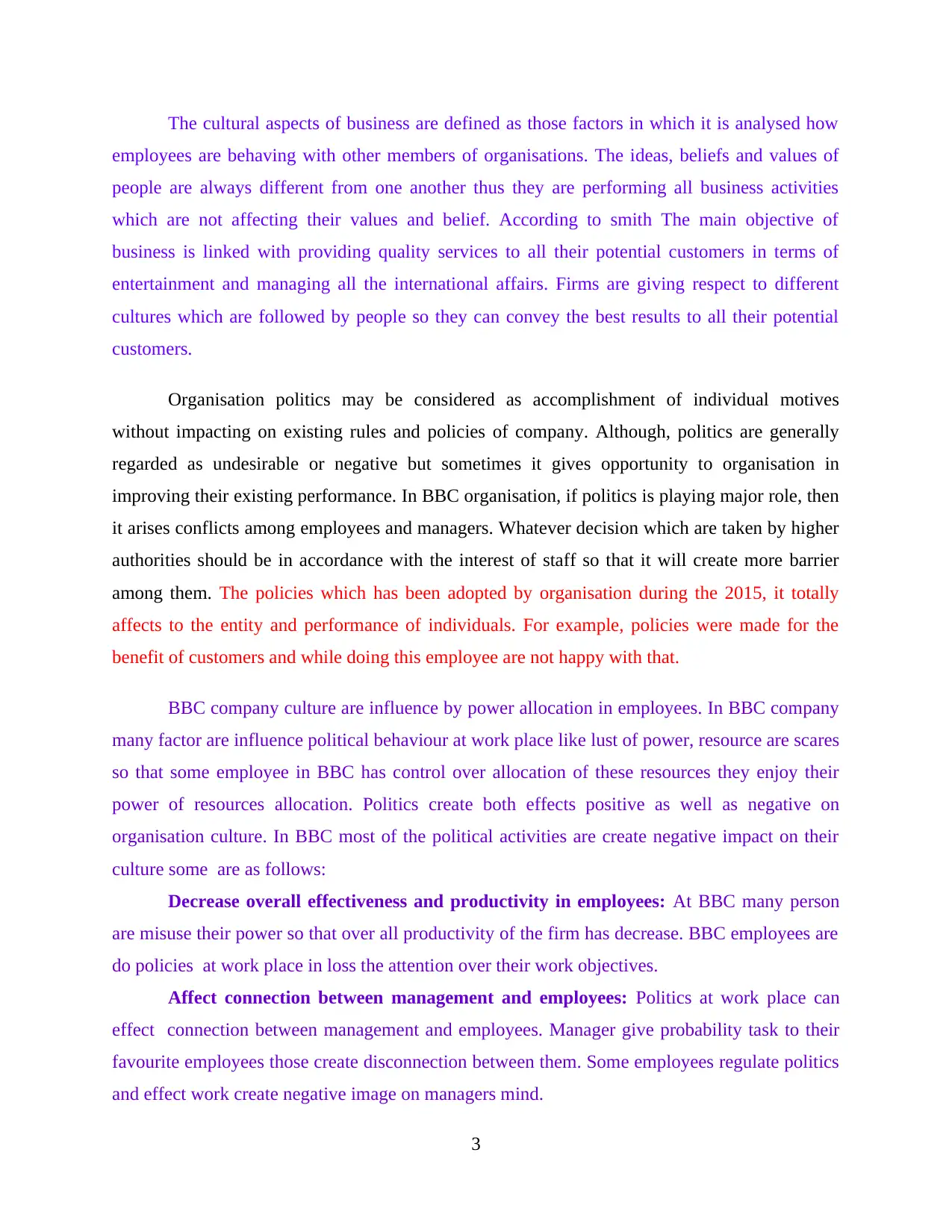
The cultural aspects of business are defined as those factors in which it is analysed how
employees are behaving with other members of organisations. The ideas, beliefs and values of
people are always different from one another thus they are performing all business activities
which are not affecting their values and belief. According to smith The main objective of
business is linked with providing quality services to all their potential customers in terms of
entertainment and managing all the international affairs. Firms are giving respect to different
cultures which are followed by people so they can convey the best results to all their potential
customers.
Organisation politics may be considered as accomplishment of individual motives
without impacting on existing rules and policies of company. Although, politics are generally
regarded as undesirable or negative but sometimes it gives opportunity to organisation in
improving their existing performance. In BBC organisation, if politics is playing major role, then
it arises conflicts among employees and managers. Whatever decision which are taken by higher
authorities should be in accordance with the interest of staff so that it will create more barrier
among them. The policies which has been adopted by organisation during the 2015, it totally
affects to the entity and performance of individuals. For example, policies were made for the
benefit of customers and while doing this employee are not happy with that.
BBC company culture are influence by power allocation in employees. In BBC company
many factor are influence political behaviour at work place like lust of power, resource are scares
so that some employee in BBC has control over allocation of these resources they enjoy their
power of resources allocation. Politics create both effects positive as well as negative on
organisation culture. In BBC most of the political activities are create negative impact on their
culture some are as follows:
Decrease overall effectiveness and productivity in employees: At BBC many person
are misuse their power so that over all productivity of the firm has decrease. BBC employees are
do policies at work place in loss the attention over their work objectives.
Affect connection between management and employees: Politics at work place can
effect connection between management and employees. Manager give probability task to their
favourite employees those create disconnection between them. Some employees regulate politics
and effect work create negative image on managers mind.
3
employees are behaving with other members of organisations. The ideas, beliefs and values of
people are always different from one another thus they are performing all business activities
which are not affecting their values and belief. According to smith The main objective of
business is linked with providing quality services to all their potential customers in terms of
entertainment and managing all the international affairs. Firms are giving respect to different
cultures which are followed by people so they can convey the best results to all their potential
customers.
Organisation politics may be considered as accomplishment of individual motives
without impacting on existing rules and policies of company. Although, politics are generally
regarded as undesirable or negative but sometimes it gives opportunity to organisation in
improving their existing performance. In BBC organisation, if politics is playing major role, then
it arises conflicts among employees and managers. Whatever decision which are taken by higher
authorities should be in accordance with the interest of staff so that it will create more barrier
among them. The policies which has been adopted by organisation during the 2015, it totally
affects to the entity and performance of individuals. For example, policies were made for the
benefit of customers and while doing this employee are not happy with that.
BBC company culture are influence by power allocation in employees. In BBC company
many factor are influence political behaviour at work place like lust of power, resource are scares
so that some employee in BBC has control over allocation of these resources they enjoy their
power of resources allocation. Politics create both effects positive as well as negative on
organisation culture. In BBC most of the political activities are create negative impact on their
culture some are as follows:
Decrease overall effectiveness and productivity in employees: At BBC many person
are misuse their power so that over all productivity of the firm has decrease. BBC employees are
do policies at work place in loss the attention over their work objectives.
Affect connection between management and employees: Politics at work place can
effect connection between management and employees. Manager give probability task to their
favourite employees those create disconnection between them. Some employees regulate politics
and effect work create negative image on managers mind.
3
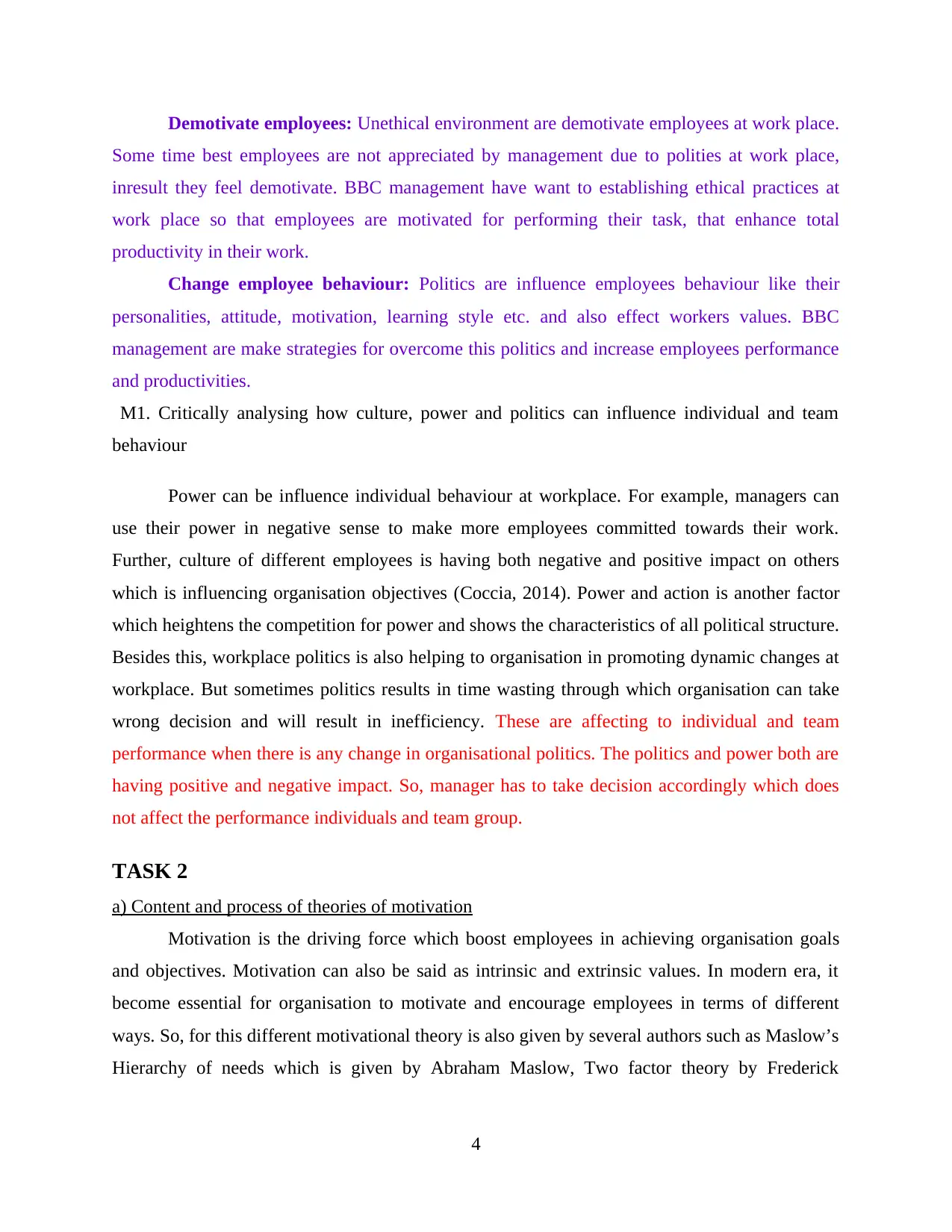
Demotivate employees: Unethical environment are demotivate employees at work place.
Some time best employees are not appreciated by management due to polities at work place,
inresult they feel demotivate. BBC management have want to establishing ethical practices at
work place so that employees are motivated for performing their task, that enhance total
productivity in their work.
Change employee behaviour: Politics are influence employees behaviour like their
personalities, attitude, motivation, learning style etc. and also effect workers values. BBC
management are make strategies for overcome this politics and increase employees performance
and productivities.
M1. Critically analysing how culture, power and politics can influence individual and team
behaviour
Power can be influence individual behaviour at workplace. For example, managers can
use their power in negative sense to make more employees committed towards their work.
Further, culture of different employees is having both negative and positive impact on others
which is influencing organisation objectives (Coccia, 2014). Power and action is another factor
which heightens the competition for power and shows the characteristics of all political structure.
Besides this, workplace politics is also helping to organisation in promoting dynamic changes at
workplace. But sometimes politics results in time wasting through which organisation can take
wrong decision and will result in inefficiency. These are affecting to individual and team
performance when there is any change in organisational politics. The politics and power both are
having positive and negative impact. So, manager has to take decision accordingly which does
not affect the performance individuals and team group.
TASK 2
a) Content and process of theories of motivation
Motivation is the driving force which boost employees in achieving organisation goals
and objectives. Motivation can also be said as intrinsic and extrinsic values. In modern era, it
become essential for organisation to motivate and encourage employees in terms of different
ways. So, for this different motivational theory is also given by several authors such as Maslow’s
Hierarchy of needs which is given by Abraham Maslow, Two factor theory by Frederick
4
Some time best employees are not appreciated by management due to polities at work place,
inresult they feel demotivate. BBC management have want to establishing ethical practices at
work place so that employees are motivated for performing their task, that enhance total
productivity in their work.
Change employee behaviour: Politics are influence employees behaviour like their
personalities, attitude, motivation, learning style etc. and also effect workers values. BBC
management are make strategies for overcome this politics and increase employees performance
and productivities.
M1. Critically analysing how culture, power and politics can influence individual and team
behaviour
Power can be influence individual behaviour at workplace. For example, managers can
use their power in negative sense to make more employees committed towards their work.
Further, culture of different employees is having both negative and positive impact on others
which is influencing organisation objectives (Coccia, 2014). Power and action is another factor
which heightens the competition for power and shows the characteristics of all political structure.
Besides this, workplace politics is also helping to organisation in promoting dynamic changes at
workplace. But sometimes politics results in time wasting through which organisation can take
wrong decision and will result in inefficiency. These are affecting to individual and team
performance when there is any change in organisational politics. The politics and power both are
having positive and negative impact. So, manager has to take decision accordingly which does
not affect the performance individuals and team group.
TASK 2
a) Content and process of theories of motivation
Motivation is the driving force which boost employees in achieving organisation goals
and objectives. Motivation can also be said as intrinsic and extrinsic values. In modern era, it
become essential for organisation to motivate and encourage employees in terms of different
ways. So, for this different motivational theory is also given by several authors such as Maslow’s
Hierarchy of needs which is given by Abraham Maslow, Two factor theory by Frederick
4
⊘ This is a preview!⊘
Do you want full access?
Subscribe today to unlock all pages.

Trusted by 1+ million students worldwide
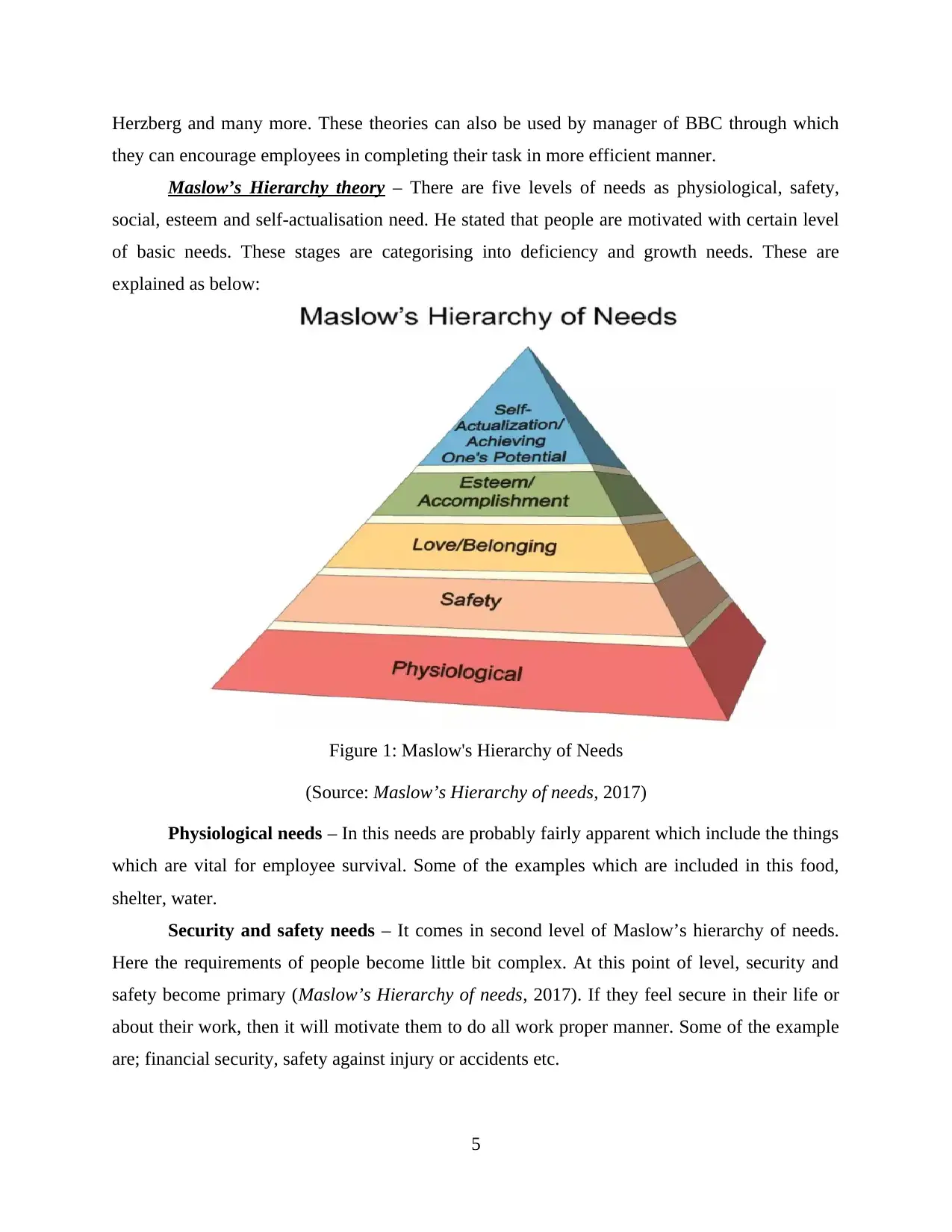
Herzberg and many more. These theories can also be used by manager of BBC through which
they can encourage employees in completing their task in more efficient manner.
Maslow’s Hierarchy theory – There are five levels of needs as physiological, safety,
social, esteem and self-actualisation need. He stated that people are motivated with certain level
of basic needs. These stages are categorising into deficiency and growth needs. These are
explained as below:
Figure 1: Maslow's Hierarchy of Needs
(Source: Maslow’s Hierarchy of needs, 2017)
Physiological needs – In this needs are probably fairly apparent which include the things
which are vital for employee survival. Some of the examples which are included in this food,
shelter, water.
Security and safety needs – It comes in second level of Maslow’s hierarchy of needs.
Here the requirements of people become little bit complex. At this point of level, security and
safety become primary (Maslow’s Hierarchy of needs, 2017). If they feel secure in their life or
about their work, then it will motivate them to do all work proper manner. Some of the example
are; financial security, safety against injury or accidents etc.
5
they can encourage employees in completing their task in more efficient manner.
Maslow’s Hierarchy theory – There are five levels of needs as physiological, safety,
social, esteem and self-actualisation need. He stated that people are motivated with certain level
of basic needs. These stages are categorising into deficiency and growth needs. These are
explained as below:
Figure 1: Maslow's Hierarchy of Needs
(Source: Maslow’s Hierarchy of needs, 2017)
Physiological needs – In this needs are probably fairly apparent which include the things
which are vital for employee survival. Some of the examples which are included in this food,
shelter, water.
Security and safety needs – It comes in second level of Maslow’s hierarchy of needs.
Here the requirements of people become little bit complex. At this point of level, security and
safety become primary (Maslow’s Hierarchy of needs, 2017). If they feel secure in their life or
about their work, then it will motivate them to do all work proper manner. Some of the example
are; financial security, safety against injury or accidents etc.
5
Paraphrase This Document
Need a fresh take? Get an instant paraphrase of this document with our AI Paraphraser
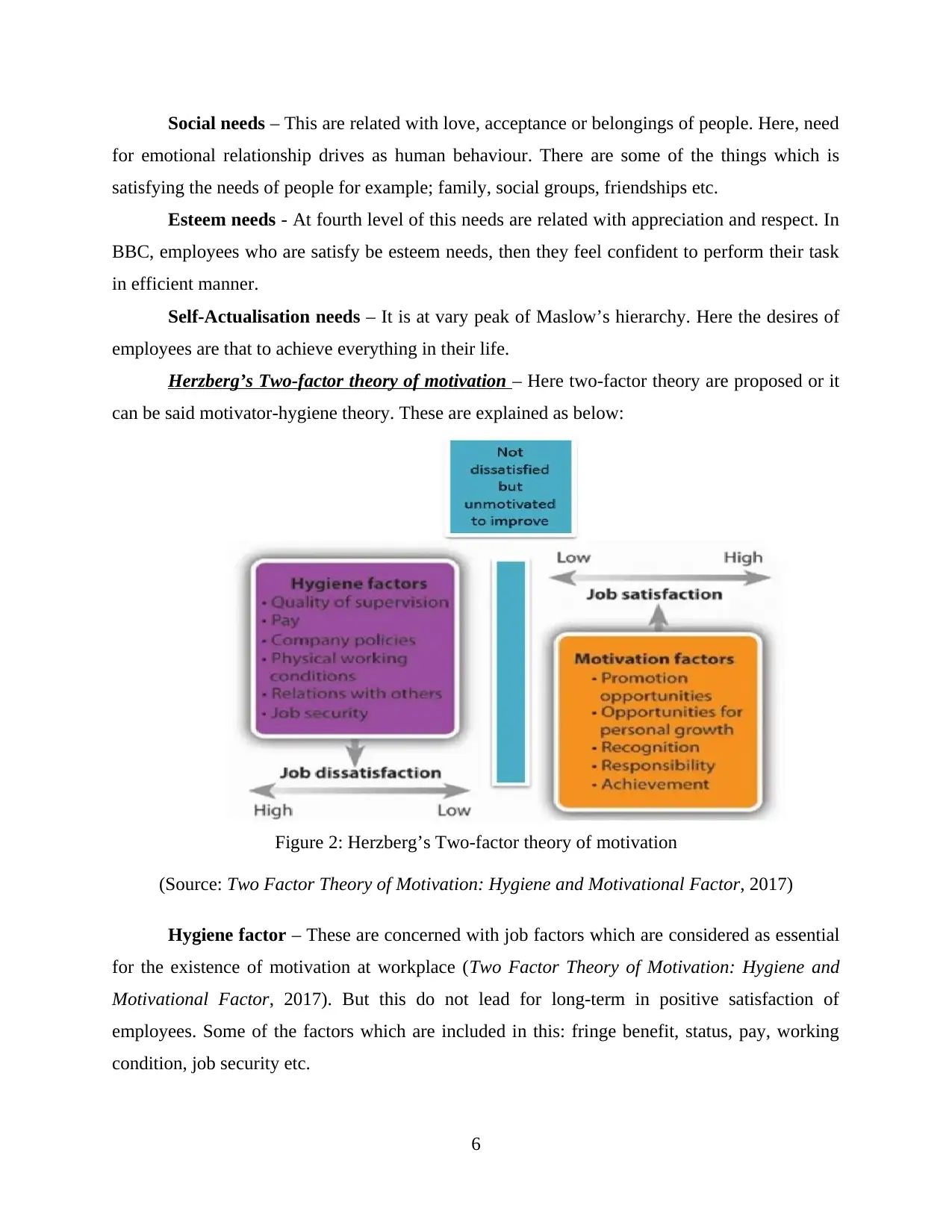
Social needs – This are related with love, acceptance or belongings of people. Here, need
for emotional relationship drives as human behaviour. There are some of the things which is
satisfying the needs of people for example; family, social groups, friendships etc.
Esteem needs - At fourth level of this needs are related with appreciation and respect. In
BBC, employees who are satisfy be esteem needs, then they feel confident to perform their task
in efficient manner.
Self-Actualisation needs – It is at vary peak of Maslow’s hierarchy. Here the desires of
employees are that to achieve everything in their life.
Herzberg’s Two-factor theory of motivation – Here two-factor theory are proposed or it
can be said motivator-hygiene theory. These are explained as below:
Figure 2: Herzberg’s Two-factor theory of motivation
(Source: Two Factor Theory of Motivation: Hygiene and Motivational Factor, 2017)
Hygiene factor – These are concerned with job factors which are considered as essential
for the existence of motivation at workplace (Two Factor Theory of Motivation: Hygiene and
Motivational Factor, 2017). But this do not lead for long-term in positive satisfaction of
employees. Some of the factors which are included in this: fringe benefit, status, pay, working
condition, job security etc.
6
for emotional relationship drives as human behaviour. There are some of the things which is
satisfying the needs of people for example; family, social groups, friendships etc.
Esteem needs - At fourth level of this needs are related with appreciation and respect. In
BBC, employees who are satisfy be esteem needs, then they feel confident to perform their task
in efficient manner.
Self-Actualisation needs – It is at vary peak of Maslow’s hierarchy. Here the desires of
employees are that to achieve everything in their life.
Herzberg’s Two-factor theory of motivation – Here two-factor theory are proposed or it
can be said motivator-hygiene theory. These are explained as below:
Figure 2: Herzberg’s Two-factor theory of motivation
(Source: Two Factor Theory of Motivation: Hygiene and Motivational Factor, 2017)
Hygiene factor – These are concerned with job factors which are considered as essential
for the existence of motivation at workplace (Two Factor Theory of Motivation: Hygiene and
Motivational Factor, 2017). But this do not lead for long-term in positive satisfaction of
employees. Some of the factors which are included in this: fringe benefit, status, pay, working
condition, job security etc.
6
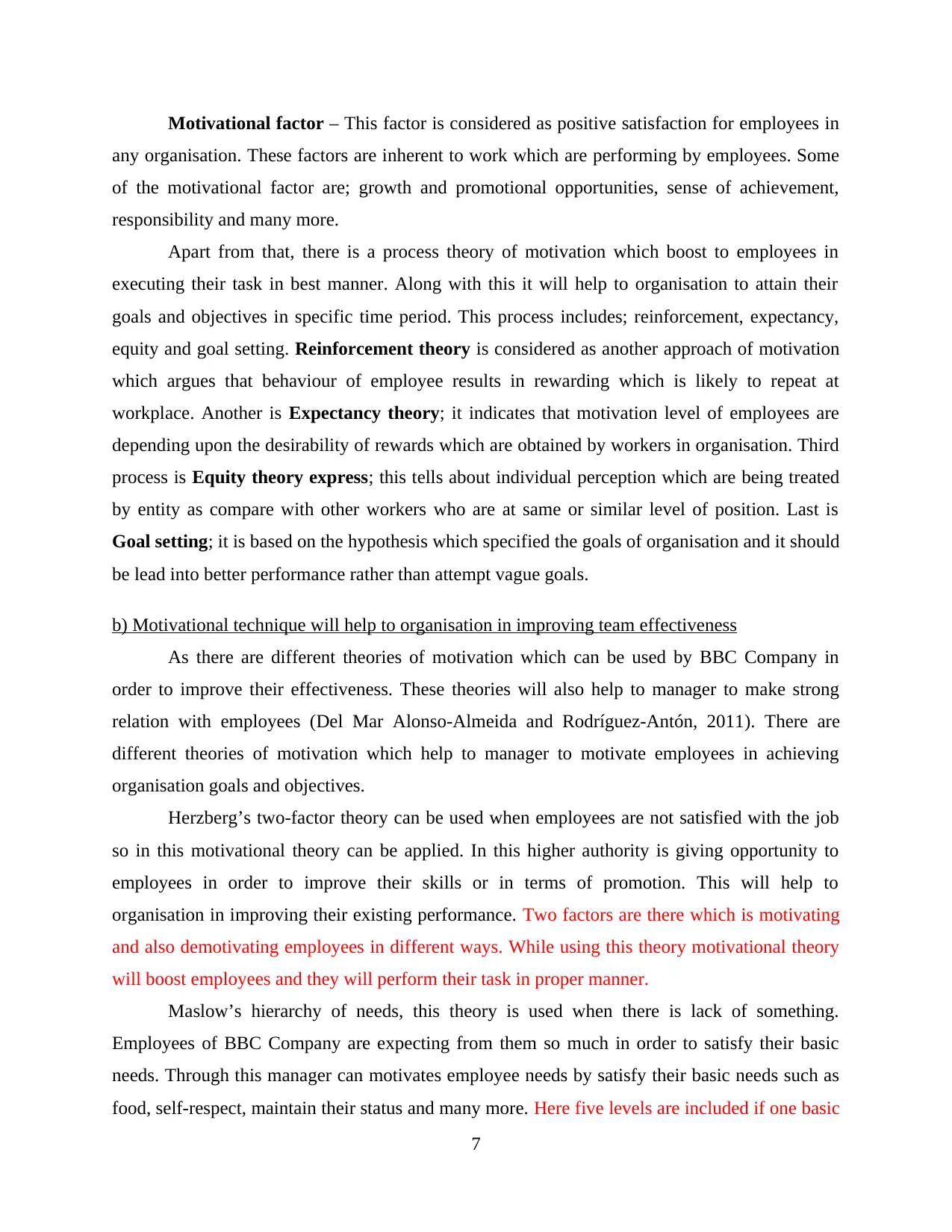
Motivational factor – This factor is considered as positive satisfaction for employees in
any organisation. These factors are inherent to work which are performing by employees. Some
of the motivational factor are; growth and promotional opportunities, sense of achievement,
responsibility and many more.
Apart from that, there is a process theory of motivation which boost to employees in
executing their task in best manner. Along with this it will help to organisation to attain their
goals and objectives in specific time period. This process includes; reinforcement, expectancy,
equity and goal setting. Reinforcement theory is considered as another approach of motivation
which argues that behaviour of employee results in rewarding which is likely to repeat at
workplace. Another is Expectancy theory; it indicates that motivation level of employees are
depending upon the desirability of rewards which are obtained by workers in organisation. Third
process is Equity theory express; this tells about individual perception which are being treated
by entity as compare with other workers who are at same or similar level of position. Last is
Goal setting; it is based on the hypothesis which specified the goals of organisation and it should
be lead into better performance rather than attempt vague goals.
b) Motivational technique will help to organisation in improving team effectiveness
As there are different theories of motivation which can be used by BBC Company in
order to improve their effectiveness. These theories will also help to manager to make strong
relation with employees (Del Mar Alonso-Almeida and Rodríguez-Antón, 2011). There are
different theories of motivation which help to manager to motivate employees in achieving
organisation goals and objectives.
Herzberg’s two-factor theory can be used when employees are not satisfied with the job
so in this motivational theory can be applied. In this higher authority is giving opportunity to
employees in order to improve their skills or in terms of promotion. This will help to
organisation in improving their existing performance. Two factors are there which is motivating
and also demotivating employees in different ways. While using this theory motivational theory
will boost employees and they will perform their task in proper manner.
Maslow’s hierarchy of needs, this theory is used when there is lack of something.
Employees of BBC Company are expecting from them so much in order to satisfy their basic
needs. Through this manager can motivates employee needs by satisfy their basic needs such as
food, self-respect, maintain their status and many more. Here five levels are included if one basic
7
any organisation. These factors are inherent to work which are performing by employees. Some
of the motivational factor are; growth and promotional opportunities, sense of achievement,
responsibility and many more.
Apart from that, there is a process theory of motivation which boost to employees in
executing their task in best manner. Along with this it will help to organisation to attain their
goals and objectives in specific time period. This process includes; reinforcement, expectancy,
equity and goal setting. Reinforcement theory is considered as another approach of motivation
which argues that behaviour of employee results in rewarding which is likely to repeat at
workplace. Another is Expectancy theory; it indicates that motivation level of employees are
depending upon the desirability of rewards which are obtained by workers in organisation. Third
process is Equity theory express; this tells about individual perception which are being treated
by entity as compare with other workers who are at same or similar level of position. Last is
Goal setting; it is based on the hypothesis which specified the goals of organisation and it should
be lead into better performance rather than attempt vague goals.
b) Motivational technique will help to organisation in improving team effectiveness
As there are different theories of motivation which can be used by BBC Company in
order to improve their effectiveness. These theories will also help to manager to make strong
relation with employees (Del Mar Alonso-Almeida and Rodríguez-Antón, 2011). There are
different theories of motivation which help to manager to motivate employees in achieving
organisation goals and objectives.
Herzberg’s two-factor theory can be used when employees are not satisfied with the job
so in this motivational theory can be applied. In this higher authority is giving opportunity to
employees in order to improve their skills or in terms of promotion. This will help to
organisation in improving their existing performance. Two factors are there which is motivating
and also demotivating employees in different ways. While using this theory motivational theory
will boost employees and they will perform their task in proper manner.
Maslow’s hierarchy of needs, this theory is used when there is lack of something.
Employees of BBC Company are expecting from them so much in order to satisfy their basic
needs. Through this manager can motivates employee needs by satisfy their basic needs such as
food, self-respect, maintain their status and many more. Here five levels are included if one basic
7
⊘ This is a preview!⊘
Do you want full access?
Subscribe today to unlock all pages.

Trusted by 1+ million students worldwide
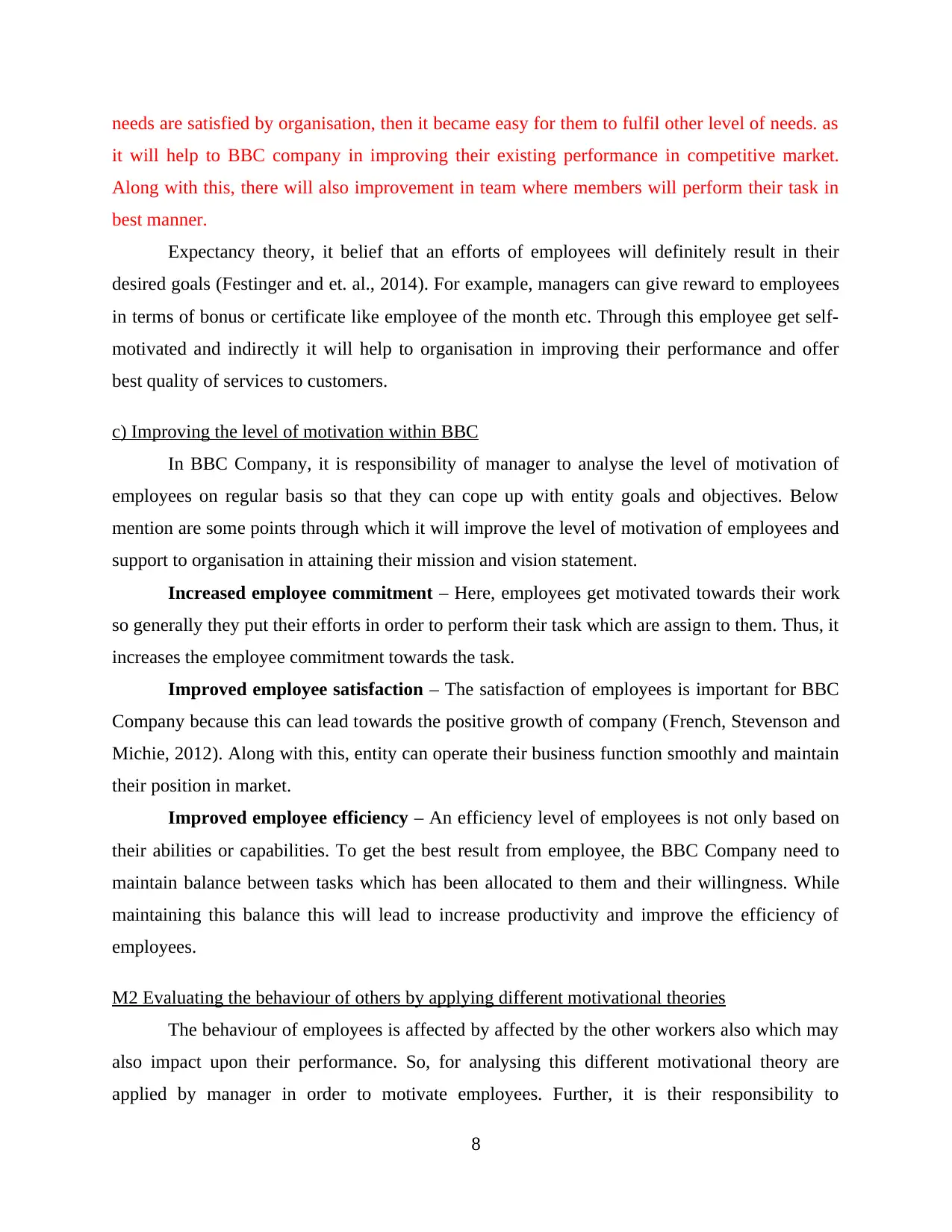
needs are satisfied by organisation, then it became easy for them to fulfil other level of needs. as
it will help to BBC company in improving their existing performance in competitive market.
Along with this, there will also improvement in team where members will perform their task in
best manner.
Expectancy theory, it belief that an efforts of employees will definitely result in their
desired goals (Festinger and et. al., 2014). For example, managers can give reward to employees
in terms of bonus or certificate like employee of the month etc. Through this employee get self-
motivated and indirectly it will help to organisation in improving their performance and offer
best quality of services to customers.
c) Improving the level of motivation within BBC
In BBC Company, it is responsibility of manager to analyse the level of motivation of
employees on regular basis so that they can cope up with entity goals and objectives. Below
mention are some points through which it will improve the level of motivation of employees and
support to organisation in attaining their mission and vision statement.
Increased employee commitment – Here, employees get motivated towards their work
so generally they put their efforts in order to perform their task which are assign to them. Thus, it
increases the employee commitment towards the task.
Improved employee satisfaction – The satisfaction of employees is important for BBC
Company because this can lead towards the positive growth of company (French, Stevenson and
Michie, 2012). Along with this, entity can operate their business function smoothly and maintain
their position in market.
Improved employee efficiency – An efficiency level of employees is not only based on
their abilities or capabilities. To get the best result from employee, the BBC Company need to
maintain balance between tasks which has been allocated to them and their willingness. While
maintaining this balance this will lead to increase productivity and improve the efficiency of
employees.
M2 Evaluating the behaviour of others by applying different motivational theories
The behaviour of employees is affected by affected by the other workers also which may
also impact upon their performance. So, for analysing this different motivational theory are
applied by manager in order to motivate employees. Further, it is their responsibility to
8
it will help to BBC company in improving their existing performance in competitive market.
Along with this, there will also improvement in team where members will perform their task in
best manner.
Expectancy theory, it belief that an efforts of employees will definitely result in their
desired goals (Festinger and et. al., 2014). For example, managers can give reward to employees
in terms of bonus or certificate like employee of the month etc. Through this employee get self-
motivated and indirectly it will help to organisation in improving their performance and offer
best quality of services to customers.
c) Improving the level of motivation within BBC
In BBC Company, it is responsibility of manager to analyse the level of motivation of
employees on regular basis so that they can cope up with entity goals and objectives. Below
mention are some points through which it will improve the level of motivation of employees and
support to organisation in attaining their mission and vision statement.
Increased employee commitment – Here, employees get motivated towards their work
so generally they put their efforts in order to perform their task which are assign to them. Thus, it
increases the employee commitment towards the task.
Improved employee satisfaction – The satisfaction of employees is important for BBC
Company because this can lead towards the positive growth of company (French, Stevenson and
Michie, 2012). Along with this, entity can operate their business function smoothly and maintain
their position in market.
Improved employee efficiency – An efficiency level of employees is not only based on
their abilities or capabilities. To get the best result from employee, the BBC Company need to
maintain balance between tasks which has been allocated to them and their willingness. While
maintaining this balance this will lead to increase productivity and improve the efficiency of
employees.
M2 Evaluating the behaviour of others by applying different motivational theories
The behaviour of employees is affected by affected by the other workers also which may
also impact upon their performance. So, for analysing this different motivational theory are
applied by manager in order to motivate employees. Further, it is their responsibility to
8
Paraphrase This Document
Need a fresh take? Get an instant paraphrase of this document with our AI Paraphraser
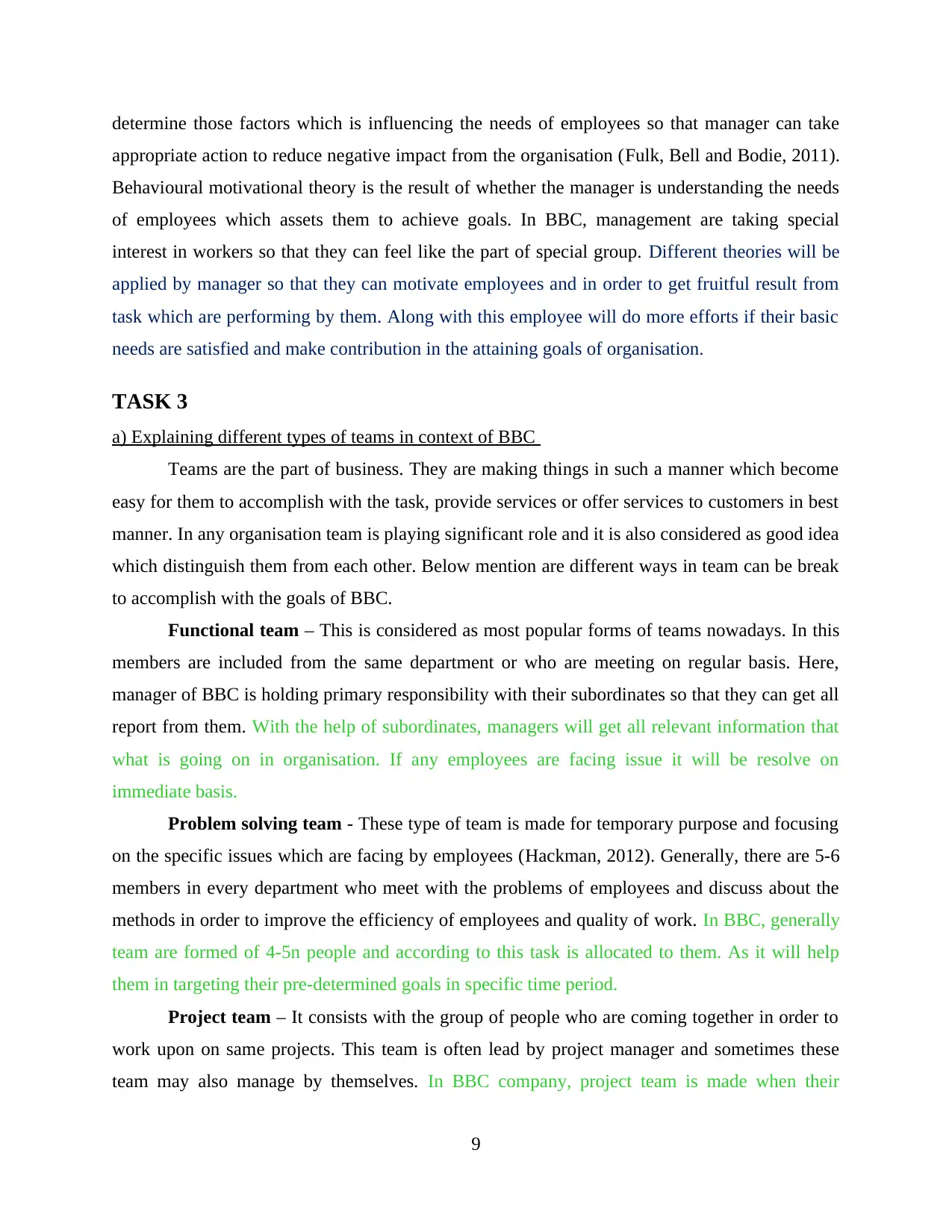
determine those factors which is influencing the needs of employees so that manager can take
appropriate action to reduce negative impact from the organisation (Fulk, Bell and Bodie, 2011).
Behavioural motivational theory is the result of whether the manager is understanding the needs
of employees which assets them to achieve goals. In BBC, management are taking special
interest in workers so that they can feel like the part of special group. Different theories will be
applied by manager so that they can motivate employees and in order to get fruitful result from
task which are performing by them. Along with this employee will do more efforts if their basic
needs are satisfied and make contribution in the attaining goals of organisation.
TASK 3
a) Explaining different types of teams in context of BBC
Teams are the part of business. They are making things in such a manner which become
easy for them to accomplish with the task, provide services or offer services to customers in best
manner. In any organisation team is playing significant role and it is also considered as good idea
which distinguish them from each other. Below mention are different ways in team can be break
to accomplish with the goals of BBC.
Functional team – This is considered as most popular forms of teams nowadays. In this
members are included from the same department or who are meeting on regular basis. Here,
manager of BBC is holding primary responsibility with their subordinates so that they can get all
report from them. With the help of subordinates, managers will get all relevant information that
what is going on in organisation. If any employees are facing issue it will be resolve on
immediate basis.
Problem solving team - These type of team is made for temporary purpose and focusing
on the specific issues which are facing by employees (Hackman, 2012). Generally, there are 5-6
members in every department who meet with the problems of employees and discuss about the
methods in order to improve the efficiency of employees and quality of work. In BBC, generally
team are formed of 4-5n people and according to this task is allocated to them. As it will help
them in targeting their pre-determined goals in specific time period.
Project team – It consists with the group of people who are coming together in order to
work upon on same projects. This team is often lead by project manager and sometimes these
team may also manage by themselves. In BBC company, project team is made when their
9
appropriate action to reduce negative impact from the organisation (Fulk, Bell and Bodie, 2011).
Behavioural motivational theory is the result of whether the manager is understanding the needs
of employees which assets them to achieve goals. In BBC, management are taking special
interest in workers so that they can feel like the part of special group. Different theories will be
applied by manager so that they can motivate employees and in order to get fruitful result from
task which are performing by them. Along with this employee will do more efforts if their basic
needs are satisfied and make contribution in the attaining goals of organisation.
TASK 3
a) Explaining different types of teams in context of BBC
Teams are the part of business. They are making things in such a manner which become
easy for them to accomplish with the task, provide services or offer services to customers in best
manner. In any organisation team is playing significant role and it is also considered as good idea
which distinguish them from each other. Below mention are different ways in team can be break
to accomplish with the goals of BBC.
Functional team – This is considered as most popular forms of teams nowadays. In this
members are included from the same department or who are meeting on regular basis. Here,
manager of BBC is holding primary responsibility with their subordinates so that they can get all
report from them. With the help of subordinates, managers will get all relevant information that
what is going on in organisation. If any employees are facing issue it will be resolve on
immediate basis.
Problem solving team - These type of team is made for temporary purpose and focusing
on the specific issues which are facing by employees (Hackman, 2012). Generally, there are 5-6
members in every department who meet with the problems of employees and discuss about the
methods in order to improve the efficiency of employees and quality of work. In BBC, generally
team are formed of 4-5n people and according to this task is allocated to them. As it will help
them in targeting their pre-determined goals in specific time period.
Project team – It consists with the group of people who are coming together in order to
work upon on same projects. This team is often lead by project manager and sometimes these
team may also manage by themselves. In BBC company, project team is made when their
9
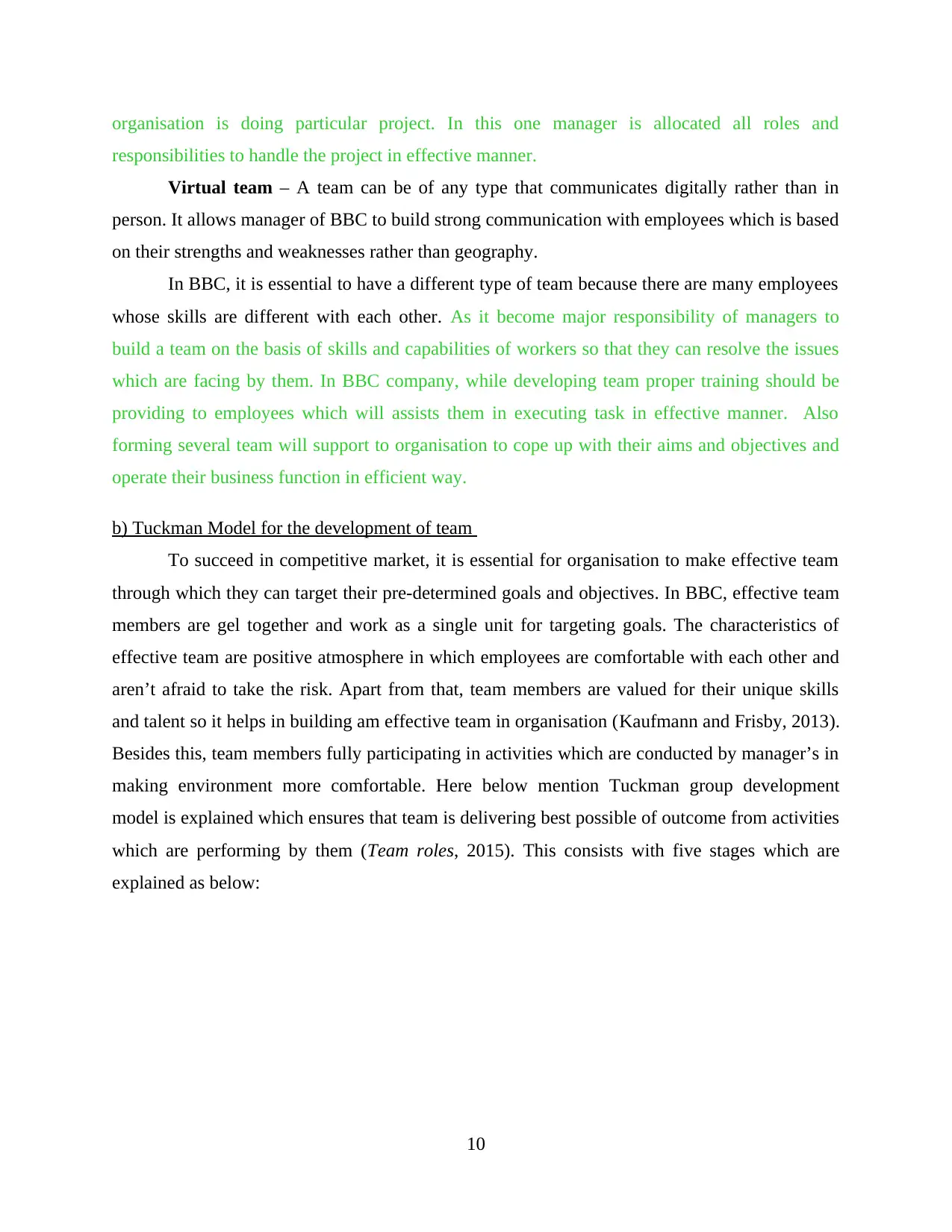
organisation is doing particular project. In this one manager is allocated all roles and
responsibilities to handle the project in effective manner.
Virtual team – A team can be of any type that communicates digitally rather than in
person. It allows manager of BBC to build strong communication with employees which is based
on their strengths and weaknesses rather than geography.
In BBC, it is essential to have a different type of team because there are many employees
whose skills are different with each other. As it become major responsibility of managers to
build a team on the basis of skills and capabilities of workers so that they can resolve the issues
which are facing by them. In BBC company, while developing team proper training should be
providing to employees which will assists them in executing task in effective manner. Also
forming several team will support to organisation to cope up with their aims and objectives and
operate their business function in efficient way.
b) Tuckman Model for the development of team
To succeed in competitive market, it is essential for organisation to make effective team
through which they can target their pre-determined goals and objectives. In BBC, effective team
members are gel together and work as a single unit for targeting goals. The characteristics of
effective team are positive atmosphere in which employees are comfortable with each other and
aren’t afraid to take the risk. Apart from that, team members are valued for their unique skills
and talent so it helps in building am effective team in organisation (Kaufmann and Frisby, 2013).
Besides this, team members fully participating in activities which are conducted by manager’s in
making environment more comfortable. Here below mention Tuckman group development
model is explained which ensures that team is delivering best possible of outcome from activities
which are performing by them (Team roles, 2015). This consists with five stages which are
explained as below:
10
responsibilities to handle the project in effective manner.
Virtual team – A team can be of any type that communicates digitally rather than in
person. It allows manager of BBC to build strong communication with employees which is based
on their strengths and weaknesses rather than geography.
In BBC, it is essential to have a different type of team because there are many employees
whose skills are different with each other. As it become major responsibility of managers to
build a team on the basis of skills and capabilities of workers so that they can resolve the issues
which are facing by them. In BBC company, while developing team proper training should be
providing to employees which will assists them in executing task in effective manner. Also
forming several team will support to organisation to cope up with their aims and objectives and
operate their business function in efficient way.
b) Tuckman Model for the development of team
To succeed in competitive market, it is essential for organisation to make effective team
through which they can target their pre-determined goals and objectives. In BBC, effective team
members are gel together and work as a single unit for targeting goals. The characteristics of
effective team are positive atmosphere in which employees are comfortable with each other and
aren’t afraid to take the risk. Apart from that, team members are valued for their unique skills
and talent so it helps in building am effective team in organisation (Kaufmann and Frisby, 2013).
Besides this, team members fully participating in activities which are conducted by manager’s in
making environment more comfortable. Here below mention Tuckman group development
model is explained which ensures that team is delivering best possible of outcome from activities
which are performing by them (Team roles, 2015). This consists with five stages which are
explained as below:
10
⊘ This is a preview!⊘
Do you want full access?
Subscribe today to unlock all pages.

Trusted by 1+ million students worldwide
1 out of 19
Related Documents
Your All-in-One AI-Powered Toolkit for Academic Success.
+13062052269
info@desklib.com
Available 24*7 on WhatsApp / Email
![[object Object]](/_next/static/media/star-bottom.7253800d.svg)
Unlock your academic potential
Copyright © 2020–2026 A2Z Services. All Rights Reserved. Developed and managed by ZUCOL.





